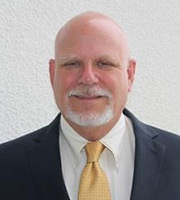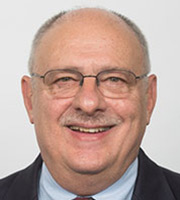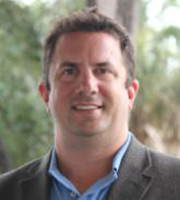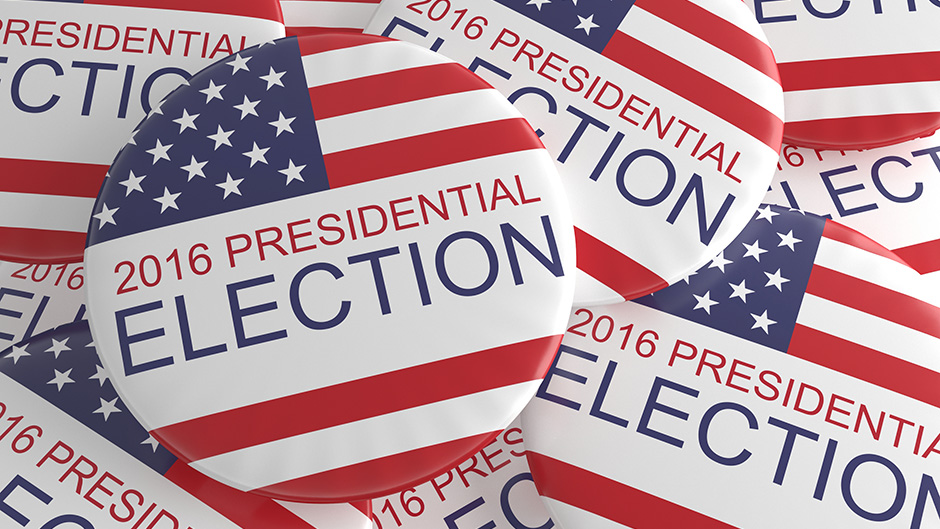The upcoming Presidential Election is unlike any other. Two very different candidates with widely disparate political experience and personalities square off against each other in a bitter, contentious battle. Neither candidate seems very popular or likeable, yet one of them will be sworn in as President of the United States come January.
What are some of the issues that fuel this campaign cycle and how will that determine how the electorate reacts in November? How will the upcoming debates influence the electorate? What other issues will come to the forefront as we near November?
Our University of Miami experts give their opinions on these topics and others.
Casey Klofstad, Associate Professor, Department of Political Science Department, College of Arts and Sciences:
 In many ways this presidential election is unprecedented. The candidates from both parties are perceived as extremely unfavorable. And, while the establishment candidate Hillary Clinton currently leads the race, more recent polls show that her lead over her outsider opponent, reality television star and real estate magnate Donald Trump, is weakening (even here in the critical swing state of Florida with 29 electoral votes at stake).
In many ways this presidential election is unprecedented. The candidates from both parties are perceived as extremely unfavorable. And, while the establishment candidate Hillary Clinton currently leads the race, more recent polls show that her lead over her outsider opponent, reality television star and real estate magnate Donald Trump, is weakening (even here in the critical swing state of Florida with 29 electoral votes at stake).
What is not unprecedented about this election, however, is the critical role of voter turnout. Coming out of the party conventions this summer, Secretary Clinton has arguably done a better job at unifying the Democratic base than Mr. Trump has of the Republican base. However, it remains to be seen whether the millions of Bernie Sanders supporters will be motivated enough to “hold their nose” and turn out to vote for Clinton. Likewise, it is unclear whether the members of the growing GOP #NeverTrump movement will vote against their party identification for Hillary Clinton, in the end change their mind and vote for Trump in the interest of party unity, or just stay at home on Election Day.
In sum, while the cast of characters in this election is unusual, the fundamental rules of the game remain the same: turnout wins elections.
David L. Steinberg, Senior Lecturer in Communications Studies and Director of Debate, School of Communication:
 This election is a choice of the lesser of two evils. In order to maintain their bases and to get out the vote, both Trump and Clinton will continue to focus on their opponent’s negatives. This focus on attacks and accusations will likely be fed by the debate moderators, who will be encouraging the combative style that is thought of as “good television.”
This election is a choice of the lesser of two evils. In order to maintain their bases and to get out the vote, both Trump and Clinton will continue to focus on their opponent’s negatives. This focus on attacks and accusations will likely be fed by the debate moderators, who will be encouraging the combative style that is thought of as “good television.”
These tactics will not generate any shift and will continue the fragmentation of the electorate and the erosion of faith in the legitimacy of the political process. The extent to which either candidate will be able to attract new support or to restore lost legitimacy of the system will be their willingness to offer positive themes, narratives, and (to a lesser degree) coherent policies combining to form an optimistic vision of the future. Such an approach could plant seeds that eventually could drive a constructive dialogue.
Remember, one of these people will be the President, so the impact of the debates will continue after the election!
David Abraham, Professor of Law Emeritus, School of Law:
 The immigration debate does not take place in a vacuum. Worldwide, mobility rates are the highest they have been in over a century. The vast movement of people, foreign people, has been very destabilizing to natives precisely because it accompanies the era of neo-liberal globalization that has so undermined the well-being of working Americans.
The immigration debate does not take place in a vacuum. Worldwide, mobility rates are the highest they have been in over a century. The vast movement of people, foreign people, has been very destabilizing to natives precisely because it accompanies the era of neo-liberal globalization that has so undermined the well-being of working Americans.
The loss of jobs to low-wage countries and the movement of people form poorer countries to the prosperous countries of the global north has set off a cascade of calls for protection and exclusion. This is visible in the rise of populist anti-system, anti-immigrant parties throughout Europe and the United States. Add to this economic anxiety the fear of terrorism and linked discomfort with alien cultures, and we have a political witches’ brew.
The comprehensive immigration reform plan almost approved by the Senate but then blocked by House Republicans would have represented a significant change in immigration policy, refocusing future legal immigration while slowly legalizing the 11 million people in the country without valid documentation, many of them deeply-rooted here. But the failure of that effort left President Barack Obama to rely on a patchwork of executive actions like DACA to make life less precarious for many while at the same time increasing the number of deportations of criminals and severe violators. This combination has pleased no one and left the impression that there is no real policy.
The fact of the matter, though, is that neither candidate really has offered an alternative. For all his bluster about building walls and “humanely” increasing deportations, candidate Trump has no substantive vision of what immigration is about. His is a demagogic appeal to fear and vague promises of repression. For all her efforts to ingratiate herself with Hispanics, candidate Clinton’s promises have been vague and not very credible.
Working people, immigrant and native, have since the end of the primaries drawn the short straw this election cycle.
Pedro Villareal III, Assistant Professor, Higher Education Program, School of Education and Human Development:
There is a stark difference between the two major party presidential candidates regarding their policy positions on higher education.
Donald Trump (R) has suggested that he will release his higher education policy agenda at a later date. However, Sam Clovis, a recent addition to the Trump campaign, has been interviewed stating that the campaign is likely to hold a position against a debt-free or tuition-free public higher education, whether at community colleges or four-year institutions. The campaign argues that his plans address the debt issue because he wants to create jobs in the economy. However, with current unemployment rates low for graduates, this may not necessarily address the issue.
In direct contrast, Hillary Clinton (D) has released “The New College Compact” which represents her formal policy position on higher education, a policy that covers a wide array of issues such as college costs, student aid, student loans and college accountability, among others. On college student debt, she has said that she wants to cut interest rates on student loans, allow current borrowers an opportunity to refinance their debt and streamline income-based repayment plans, among other things. In a bold move, Clinton’s proposals would also address college costs by eventually allowing students whose family incomes are less than $125,000 to pay no tuition at public, in-state colleges.
If Trump wins the election, there is little doubt that there will be little movement to address college debt from a political perspective. If Clinton wins, there might be more interest but without congressional support, there is little chance for significant policy changes.
Joseph Uscinski, Associate Professor, Department of Political Science Department, College of Arts and Sciences:
 In this election, conspiracy theories abound! Ted Cruz’s father killed JFK, Hillary Clinton has a body double, and Donald Trump is the pawn of powerful Russian interests. And by the way, the election will be rigged!
In this election, conspiracy theories abound! Ted Cruz’s father killed JFK, Hillary Clinton has a body double, and Donald Trump is the pawn of powerful Russian interests. And by the way, the election will be rigged!
Instead of focusing on substantive issues, the candidates are instead accusing their opponents of taking part in secretive and nefarious activities. The media seems to relish in the schemes and skullduggery. What can you do as a voter to stay above the fray and know what is true and what is not?
The best advice is to pay attention to several sources of news, in particular news outlets which provide in-depth coverage of political issues. I personally recommend the Monkey Cage column in The Washington Post.
Joaquin Roy, Jean Monet Professor of European Integration, Director of UM’s European Union Center:
Few leading European personalities and analysts had predicted a year ago that the competition for the U.S. presidency would end up between an expected Democratic designee, Hillary Clinton, contested from the left by Socialist Senator Bernie Sanders, and a Republican business tycoon with no practical political experience.
The conflicting opposition and predictions of a policy made Donald Trump a very uncomfortable prospect for a future relationship. Although systematically respectful of a tradition of avoiding to express any preference, the European leadership (conservative or left, north or south, from large and small countries) in private expressed worries on how to deal with a possible Trump victory. In any event, the bulk of the European Union’s establishment never considered this outcome as possible. This feeling could be the expression of a realistic wishful thinking. For their part, public opinion and media reaction on the progress of the Trump candidacy have been a combination of amusement, disbelief and outrage.
So, a defeat of the Republican candidate would mean the confirmation of a welcome sign of relief. The European leadership did not need another worry to deal with, on top of the economic problems, uncontrolled immigration, terrorism, nationalism and confrontations with Russia. Europe needs a stable relationship with the U.S., a prospect that some of the plans issued by Trump did not endorse. Trade agreements, investment strategies and security projects were placed in danger, with Brexit in the background. Clarification in 2017 is seen as more feasible under a Democratic presidency.
Note to media: To interview our UM experts please contact Barbara Gutierrez, at 305-284-3205 or at bgutierrez@miami.edu

